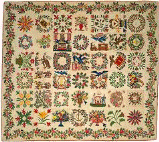Textile Society of America

Textile Society of America: Symposium Proceedings
Date of this Version
2024
Document Type
Presentation
Citation
Textile Society of America 2024 Symposium
Shifts & Strands: Rethinking the Possibilities and Potentials of Textiles, November 12-17, 2024, a virtual event
Abstract
There has been a shift in methodologies in the broader world of design. Today, co-design and participatory methods are a vital part of the modern designer's toolkit, and designers are finding new ways to interact with communities and design solutions that are more responsive to the actual needs of those communities.
Textile design has historically been a medium for expressing and processing traumatic experiences, reflecting individual and collective traumas in society. Textiles have also historically served not only as a form of artistic expression but also as a powerful tool in activism, particularly within feminist movements. Recent developments have seen textiles embraced as a means of engagement and understanding within communities, paralleling the shifts towards participatory design methodologies.
This paper explores the integration of trauma-informed and trauma-responsive practices, which derive from social work, into textile-based research methodologies. These practices offer innovative ways for designers to connect with and respond to community needs more effectively. Through an analysis of existing literature, this paper bridges historical artistic approaches and contemporary trauma-informed design methodologies, providing insights on how designers and researchers can incorporate textile-based methods into traditional design research toolkits. It details how the distinct knowledge domains within textile practices combine to foster a uniquely ‘textile’ way of thinking, and how these methodologies can be integrated into traditional design research toolkits to enhance research and problem-solving in interdisciplinary contexts.
Included in
Art and Materials Conservation Commons, Art Practice Commons, Civic and Community Engagement Commons, Community-Based Learning Commons, Community-Based Research Commons, Fashion Design Commons, Fiber, Textile, and Weaving Arts Commons, Fine Arts Commons, Inequality and Stratification Commons, Museum Studies Commons


Comments
Published by the Textiles Society of America
Copyright 2024, the authors. Used by permission